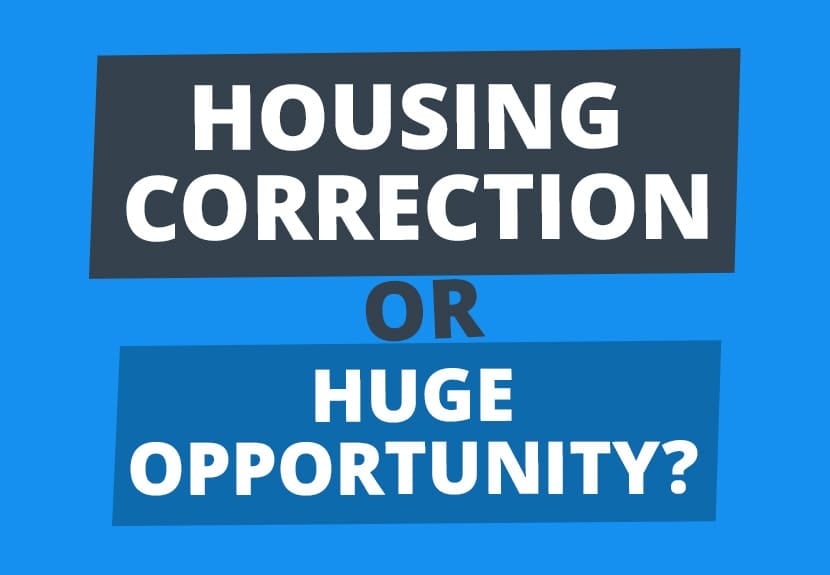The 2023 housing correction could be the PERFECT time to invest in real estate. Don’t believe us? Maybe you’ll be more convinced by Dave Meyer, VP of Data and Analytics at BiggerPockets and real estate investor who got his start right after the 2008 housing market crash. For a fresh-out-of-college Dave, this was one of the scariest purchases he could have ever made. Right off of the Great Recession, no one knew which way the housing market would head, but because Dave took an educated, data-backed risk, he’s been rewarded handsomely with passive income.
And if you’re like most new real estate investors, you want to find financial freedom and spend more time doing what you love while building wealth in the background. Now, with skittish sellers and high mortgage rates scaring away many would-be-homebuyers, you can pick up real estate deals that could propel your wealth forward for years to come. And in this webinar, Dave will show you EXACTLY how to find, analyze, and finance your real estate deals. He’ll also dive deep into the data behind today’s housing market and prove why now may be one of the BEST times to buy real estate in years.
Now is YOUR time to start building wealth. Don’t sit on the sidelines while others are reaching financial freedom. Become a BiggerPockets Pro member and get access to exclusive rental property calculators, lease templates, property management software, and access to bootcamps that will take your knowledge to the next level. Sign up for BiggerPockets Pro and use code “INVEST23” for 20% off and a special gift from Dave!
Dave:
Welcome to today’s bonus episode of the BiggerPockets podcast. We’ve seen continuously new record highs for home prices for the last several years, and that is not necessarily where you want to buy. That is often why money is made during a corrections because you have an opportunity to buy below market value.
Over the last couple years, we are very, very clearly in a seller’s market. You know this because the rebidding wars, right? That means that the seller could just pick the highest offer. Sellers could really dictate the terms of any transaction. That has completely changed. What’s going on everyone? I’m Dave Meyer. I’ll be your host for today’s bonus episode.
We are giving David Greene a very well-deserved day off, so I can talk about one of my favorite topics, a topic I’m super passionate about and I’d like to think an expert in which is how to invest during a market correction. I think we all know that the housing market is very uncertain and a little bit confusing right now, but there are really good ways to invest if you can identify the right types of opportunities.
There is risk in today’s market for sure, but with risk comes reward, their sort of counterbalances for each other. And investing successfully during a housing correction is all about spotting the right opportunities and using the right strategies and the right tactics that are appropriate for this type of economic environment.
If you guys don’t know me, I work full-time at BiggerPockets as the vice president of data and analytics. I host the On The Market podcast, which comes out Mondays and Fridays. I’ve written a book called Real Estate by the Numbers. And through all of these efforts, all this stuff that I do and spend most of my life doing, a lot of what I do is study the housing market.
I talk to experts all the time. I look at data to try and understand what is exactly going on in the broader economy, what is going on in the housing market, and I try to make sense of it so that all of us as real estate investors can use the appropriate tactics and to know how to invest appropriately with the least amount of risk, the best amount of upside during this type of market condition.
And so through those efforts, and even though we are in a confusing economic time, there are absolutely still good ways to invest in real estate right now. This is not just an academic exercise for me. I am also a real estate investor. I’ve been investing for more than 12 years now. And I’ve already done two deals in 2023 even though I know that we’re in a housing market correction. And I can do that confidently because I know which tactics and strategies to use.
So to share all the information that I have gathered and that I use myself in my own investing, I recently created a webinar for BiggerPockets and how to invest during a housing market correction. So basically we’re going to replay that webinar for you today and we’re going to go over some really important topics.
First and foremost, we’re going to talk about what exactly is going on in the housing market right now and why it is happening. I think there’s a lot of fear out there about the housing market because if you don’t really understand the fundamentals that are driving the housing market behavior right now, it can be a little bit confusing. So we’re going to talk about what is going on.
Next, we’re going to talk about the strategies that you can use to mitigate what is going on in the current environment and then I’m going to actually help you learn how to find good deals in this market, analyze those deals, and ultimately execute on the opportunities that are coming right now. Because I want you all to know that there are actually good opportunities right now.
With the risk and the uncertainty that comes in this kind of market, a lot of people jump out of the housing market and that means there are better deals, there are better opportunities for the people who know how to adjust and invest in this environment. So without any more ado, we are going to jump into this webinar so you can learn how to invest during a housing correction. Do you feel some sort of economic or financial anxiety right now?
I know this is really common, A lot of people are feeling that. So if you’re feeling that way, that is completely normal. Maybe you’re worried about a recession, a lot of people are talking about that, or inflation has really had an impact on you, or you’re worried about a layoff or a job loss. These are genuinely stressful things. Why are they stressful? Because they’re out of our control, right?
As people, we get stressed about the things that we don’t have an impact over, that we can’t directly control. And for most people, money and finances and whether or not you get laid off are out of your control. But what if it were different? What if you had control of your financial future? What if you had more time to spend with your family and doing the things you love?
What if you earned money passively from sources other than your full-time job? What if you had the freedom to do what you want, when you want and with who you want? Well, that my friends is financial freedom and it’s really at the heart of what we’re going to be talking about today on today’s webinar. Because today is all about how to achieve really any financial goal that you have through real estate investing.
And we’re also going to talk specifically about how you can do that, how you can kickstart your investing journey really during any market conditions. By the end of this webinar, you will have a plan to build long-term wealth, yes, in today’s housing market conditions.
I know it might seem daunting to get started right now, but by the end of this webinar I promise you, you will have a plan and you will see that there is great opportunities to build long-term wealth even in today’s housing market conditions. Plus, we also have some great giveaways for you at the end. It’s something I don’t think I’ve ever given away before, so definitely stick around for that.
For today’s agenda, basically what we’re going to start with just talking about what in the world is going on in the housing market in 2023. That’s going to be first and foremost because I think if you understand that, if you understand what’s going on in the market and the fundamentals, some of the economic conditions that are driving the behavior and things that we’re seeing in today’s market, it will help you overcome any anxiety you have about the current day market.
Then we’re going to talk about what business plans work in the current market. If you know a little bit about real estate investing, you probably know that there’s a ton of different ways that you can invest in real estate, but only some of them work in today’s market conditions.
You can’t just go out there and buy anything, certain types of strategies, certain types of properties, certain types of tactics, probably not great for a correction like we’re in right now. But there are plenty that work during a correction, so we’re going to cover which ones you should be thinking about and focusing on given the current market conditions.
And then lastly, we’re going to talk about how to find those good deals. So once you know what’s going on in the market and what business plans work in this type of economic cycle, then you can go out and find the deals that work in this type of market and you can pursue them.
So that is today’s agenda. If any of you don’t know me, let me just quickly introduce myself so you know who is talking to you right now. My name’s Dave Meyer. I’ve worked full-time at BiggerPockets as the VP of data analytics. I’ve worked here at BiggerPockets full-time for more than seven years now, but I’ve also been a real estate investor for more than 12 years.
I mostly invest in rental properties. I also invest in syndications, I do some lending. I’ve been in short term rentals. So I’ve done a little bit of it all over the last couple of years and I’m really excited to share some of that experience with you. I also host On The Market podcast.
It comes out every Monday and Friday on the BiggerPockets podcast feeds. And if you like the type of information we’re talking about today, some of the data, market conditions, that’s what we talk about on On The Market, so you can check that out. I’m also the author of a book called The Real Estate by the Numbers, which teaches you how to analyze deals like a pro.
We’re going to talk a lot about deal analysis today because that is super important to today’s market condition. So I’ll share some of my expertise about deal analysis today, and that’s me. If you want to connect with me after this, you can always do that on BiggerPockets or you can find me on Instagram where I’m @thedatadeli.
I love data as you are going to see over the course of this podcast, but I also love sandwiches. It’s my other passion, so that’s why you get the data deli. But if you don’t have any questions or want to ask me anything after this webinar, the best place to do that is on Instagram where I’m @thedatadeli, check it out.
So before we get into this, so let me just tell you a story about how I got started investing in real estate. And as I said, I started over 12 years ago. I started buying in early 2010. And it’s hard to remember right now, but that was a very uncertain economic time. The housing market really started to go down in 2007 and 2008. It was still going down at that time, and so it was really uncertain.
When I first got started, I knew exactly zero people who were actively buying real estate. And when I told some friends and family that I was intending to get into real estate at a rental property, most people thought I was crazy because the market hadn’t bottomed. It was still really uncertain what was happening with housing prices. But I knew that over the long run housing prices really always go up, even though 2008 was just so you know, the worst housing crash I think I’ve ever, than I’ve ever seen data for in the United States.
And so even though I saw that, I knew that housing prices over time, asset prices go up. And so I did a couple of things back then to protect myself and to ensure that even though that I was buying in uncertain market conditions, that it was still a good investment. So the first thing I did was I bought well under the list price.
I knew that the market hadn’t bottomed yet and I was a little bit worried that prices could fall a little bit further. So what I did was when I offered on properties, I offered below what the current market value was. That way if prices fell a little bit further, then I would have some cushion on my equity. The next thing I did was I earned money from things that don’t really concern housing prices.
And we’re going to talk a lot about this today, that housing prices do not equal profit. There are many other ways that you earn returns as a rental property investor. So I made sure that I bought a property that headstrong cash flow, that I earned money for amortization, otherwise known as loan pay down and value add.
I was able to make the property more valuable than it originally was through concerted and specific actions. And I also got great tax benefits which weren’t in any type of market conditions. So I focused on these things even though the market was really uncertain and I didn’t know what was going to happen and I pulled the trigger.
And now looking in retrospect, I can tell you what happened, and what happened was the value of my property actually went down after I purchased it, not by a whole lot and I was protected against it because I bought under asking price, but the housing market, at least in Denver, didn’t really bottom until 2011 and I had bought in 2010.
So for a short period of time there I was seeing my property value go down at least on paper. But it didn’t really matter to me because I was earning really good cash flow, I was still getting amortization and I was doing value add. I was getting great tax benefits. And 12 years later, I obviously don’t really care that my property value went down temporarily because over time, as the housing market always does, and we’re going to talk about that a lot today, it went back up. And you only lose money if you actually sell the property.
Right? The housing prices only matter at two points, when you buy the property and when you sell the property. What happens between those two things, of course it matters sort of emotionally, but it doesn’t really matter. And when I sold the property, this property I sold back in 2018, it had gone up literally three times the amount. So yes, it went down a little bit. I bought it for something like $457,000, something like that. That’s very precise. I bought it for about $457,000. In 2018, I sold it for well over a million dollars.
And I’m not saying that’s going to happen for every deal, but yes, it was a little bit concerning that housing prices went down, but housing prices go up over the long run and I was easily able to recover that and more because I had a long-term business strategy. I also want you to know that I wasn’t just buying deals back then. I am practicing what I preach. I have done deals already this year in 2023, even though I know the housing market isn’t a correction.
I study this for a living. I know we’re in a correction, but I’m still doing deals because I know these things. I know how to analyze deals given the current market conditions. I know that housing prices do not equal profit. There is a lot more that goes into rental property investing than just the value of your assets. And I also invest using the specific business models that work in any market conditions.
So that’s what I’m doing. But let’s get to you. Right? Should you be buying in today’s market, right? Let’s get to the elephant in the room and talk about what is going on in today’s market. I want to just start by telling you this, that every experienced investors I know, it’s not just me, but every experienced investor I know is active in the market right now.
And that is because experienced investors, generally speaking, not every single person knows this, but experienced investors know a couple of things. People have been through some market cycles generally know these things. The first thing is that money is actually made during a correction. Right? You don’t necessarily want to buy at the top, which is where we’ve been over the last couple of years.
We’ve seen continuously new record highs for home prices for the last several years, and that is not necessarily where you want to buy. That is often why money is made during a correction is because you have an opportunity to buy below market value. And of course, I really want to stress this a lot today over the course of this webinar is that you cannot buy just anything. Don’t go out and just buy any home that you see. You need to buy smart.
But the lesson here is that corrections create opportunities, right? Risk and reward, it’s like yin and yang. They balance each other out. So yes, is there risk in the market right now? Yeah, there is risk that the market is going to go down. But that risk also creates opportunities. You just need to find them. As the great Warren Buffett, one of the most famous investors in the world said, “Be fearful when others are greedy.
Be greedy when others are fearful.” And I think others are fearful right now. And I know it’s logical to be fearful in some ways right now, but if you know what experienced investors know, you’ll see that there are great opportunities right now. The main reason there are opportunities is because we are now in a buyer’s market. This is something that confuses people a little bit so let me just take a minute to explain this.
But what it means when I say that we are in a buyer’s market, it means that buyers have the power. Right? It’s that when you’re going to negotiate, usually one side or the other has more leverage. Either sellers have the leverage, that’s a seller’s market or the buyers had the leverage and that’s a buyer’s market.
Over the last couple years we were very, very clearly in a seller’s market. You know this because there were bidding wars, right? That means that the seller could just pick the highest offer, that buyers were often waving contingencies like their appraisals or their inspections and sellers could really dictate the terms of any transaction.
That has completely changed. We are now in a market where buyers have the power, buyers are being able to negotiate really great concessions. Buyers are getting sellers to pay down part their rate on their mortgages. Right? So buyers have the power. And today, you’re going to learn how to use that power to your advantage.
The other thing, I said this a few times and I’m going to keep saying it, the other thing that experienced investors know right now is that housing prices do not equal profit. And I know it’s easy to focus on housing prices, but there is so much more to real estate investing than housing prices. There are actually five different ways to earn money, and appreciation, which is really housing prices, is just one of them.
It’s also the least important, which we’re going to talk about. But I just want you to know this isn’t stock. This isn’t buying a stock, this isn’t buying crypto. The price of an asset isn’t the only consideration in real estate investing. You need to factor in other things like cash flow and amortization, value add and tax benefit. So that is why so many people I know are active and why I think you should at least consider buying in today’s market.
So let’s just dive into, let me just explain for a few minutes what is going on with the housing market. Because there’s a lot of understandable fear, but I think I really find that if you understand the fundamentals, what is driving this behavior, fundamentals of the housing market, it can help you overcome any market anxiety that you have.
So we need to discuss this because you, I’m sure you’re all wondering, should I really be investing? What happens if prices go down? And these are very reasonable questions. So let me just explain what’s happening in the housing market. Over the long term and the history of the United States, housing prices typically go up, they trend upward.
Over the long run they have always, always, always gone up. Now there are times when it goes down, that’s known as a correction. There are time when it goes flat as well, but over the long run it is normally a relatively boring and predictable thing. Housing prices go up slightly above the pace of inflation. Now what’s happened since 2008, since after, in sort of the aftermath of the great recession is we’ve been in a low interest rate environment.
And what happens when interest rates are really low is it makes leveraged assets like real estate, things that you take out loans on. That’s what leveraged asset means. It makes them, the value of them go up. So we’ve seen asset values go up a lot from 2008 to 2020. Then when we got to 2020, things basically just went on steroids. It’s the same situation in a lot of ways, but it was just even more dramatic, right?
Interest rates went even lower than they have ever been. And then we also had the combined impact of all this money printing, all this increase in monetary supply which just made affordability skyrocket. And affordability is a really important factor in the housing market, because when more people can afford to buy homes, generally speaking, more people want to buy homes. Right?
We are now at a part where millennials, which is the largest demographic group in the United States now are reaching their home, peak home buying age. So a lot of people want to buy houses right now. And in 2020 with all this money printing and super low interest rates, a lot of people jumped into the market.
And I think this is something that people miss is that in 2020 and 2021, even though prices were going up a lot, it was one of the most affordable times in US history to buy a home. Because interest rates have a huge impact on affordability, so does all the increased monetary supply. And though, even though prices were going up a lot, it was still really affordable.
When I think about the housing market, I like to think of it as a scale sometimes, right? Because there’s not one thing that is impacting housing prices. Right? It’s not just mortgage rates, it is not just supply, it is not just affordability, it is all these different things. And from 2020 to 2022, literally every single variable that I can think of, every important factor that impacts the housing prices was putting upward pressure on the market.
It was all on one side of the scale. Right? Everything from bond yields, mortgage rates, demand, inventory, supply, how much money people were making in crypto and stock markets. All of those things contributed to the housing market going up and up and up and up. And that’s basically what happened up until June of 2022.
But then things obviously changed. Right? The fed in response to high inflation started to raise interest rates. And that has a negative impact on affordability. And affordability, like I just said, is super important in the housing market. And when affordability turns negative, it puts downward pressure on pricing. So ever since mortgage rates started to go up, we have entered what I would consider and I would call a housing correction.
Now this doesn’t mean that everything is going to crash necessarily. Right? As I just said, when I think about the housing market, I think of it as a scale. Right? There are different variables and they balance out to impact prices. So whereas in 2020 and through 2020, the first half of 2022, everything was pushing prices up. Now some of the major factors have moved to the other side of the scale.
Right? Now, demand and affordability are putting downward pressure on the market. Right? That doesn’t mean that everything is pushing down. Inventory, supply, demographics are still sort of on that upward pressure side, but we are now in a much more normal market where certain macroeconomic conditions are pushing the housing, are putting upward pressure on the market and certain macroeconomic conditions are putting downward pressure on the market.
And this is normal. But right now I do think there is more pressure downward and that’s why we’re seeing prices to start to come down. Prices have definitely come down on a seasonally adjusted, inflation adjusted basis since its peak in June of 2022. I don’t know what’s going to happen, but personally I believe housing prices are going to continue to fall through 2023.
And that’s okay. We’re going to talk about that. It is okay that prices are going to fall. As I’ve said, I’m still investing and I still think there are opportunities, but this is what I want you to know. I’m explaining this because I want you to know that this is not 2008. There are very considerable differences between what is going on. And yes, housing prices are going to come down, but I personally don’t think that there’s going to be this foreclosure crisis that we saw in 2008.
I don’t think there’s going to be selling, forced selling which caused the extended decline of housing prices in 2008. To me, this is all about affordability. And as soon as affordability improves in the market, we are going to see people jump back in the housing market’s going to bottom and resume probably it’s boring growth. I don’t think it’s going to explode again, but that boring predictable growth that we as investors actually really like.
I love boring, predictable growth. And so to me, this is really an issue about affordability and there are still, the thing that encourages me and why I’m still buying is that there are still very strong long-term fundamentals for the housing market. Even though we were in a short-term correction, I think there are three things that really point to better housing prices and that a resumption of those long boring gains in housing prices over the long run.
The first one is housing shortages. Experts estimate that the US is somewhere between three and seven million homes short of how many homes we need for people. If you know anything about supply and demand, when there is a shortage of supply that puts long-term upward pressure on prices. So I think that’s something that encourages me that home prices are going to go up again after this correction.
The second is demographic demand. Right? I just said that millennials and Gen-Z are starting to hit their peak home buying age. And there are a lot of these people and they want homes, they want homes just as much as everyone, but they’ve been priced out of it and they have a lot of demand for these homes. So once they can afford it again, I truly believe that millennials and Gen-Z are going to jump back into the housing market.
And the third one is credit quality is really high. The reason in 2008 that the housing correction got so bad and turned into a full-blown crash for several years is because the loans that people were using to buy homes were absolute garbage. People were not qualified to be taking out the loans that they were. There was really no chance that a lot of these people were ever going to be able to repay the loans that they had taken out.
And that is not true anymore. Credit quality is extremely high right now. And even though we are entering a correction, foreclosures and people going into forbearance and defaults are still very, very low in a historical context. So I’m going to say this again, the correction that we’re in right now is real. Housing prices are going down. But the correction is affordability problem.
It is not some fundamental problem with the entire housing market, it is a problem with one part of the market, which is affordability. And affordability problems get resolved in one of two ways. And I want to just be clear, they do get resolved. So basically the two things that can happen is one, home prices could go down. Right? That would help improve affordability. We’re already starting to see that.
That is one symptom of an affordability problem, is housing prices start to come down. The other way that this gets resolved is mortgage rates come back down because that has a huge impact on affordability as well. And those are the two different things that can happen. And in reality it’s probably going to be a combination of the two.
We’re probably going to see housing prices come down in 2023 and then we’re also probably going to see at some point in either late 2023 or some point in 2024, we’re going to see mortgage rates come down into the low 6%s or even the high set 5%s. And that’s going to restore affordability into the housing market and it will probably bottom out and start to grow at that slow and boring predictable rate again.
So what happens during this type of affordability correction is that certain markets, the ones that are really unaffordable, think markets like I don’t know, Seattle and Austin and San Francisco, New York, the markets that are very unaffordable are probably going to come down the most over the coming years.
Because this is an affordability crisis, and those cities, they’re all very, every city is very different. And those cities are probably going to be impacted the most. On the other hand, there are certain markets that are still relatively affordable and if you don’t live in one of these cities, you probably find this hard to believe, but it is true. There are still markets where you can find affordable homes.
I think of a city like Philadelphia where you can see that these markets are still relatively affordable for the people who live there. And these markets will probably stay flat, they might go down a little bit or stay relatively flat and some of them could keep growing. I just read something recently about how home prices in Boston are still going up.
So we’re going to see different behavior in different markets. And to me, it’s really dictated by affordability. Now the question many of you are probably wondering is when is this going to end? When are things just going to become easy and simple and predictable? And I’m sorry to say we don’t know. I know that you were hoping that I have some crystal ball and I could tell you when the market is going to bottom, but I just don’t know.
But the thing that you shouldn’t know is that that’s okay. It is okay that we don’t know it’s going to bottom because there are still ways that you can invest in today’s market and we’re going to get into that. So let’s get into it. What works in this market? Let’s talk about business plans and tactics that work for investing in this type of affordability correction that we’re in.
So the first thing to me is planning past the uncertainty. So I know it is uncertain what’s going to happen this year in 2023. It’s kind of uncertain what’s going to happen in 2024. I don’t know what’s going to happen with housing prices, I just told you that. But I know I feel very confident that five years from now housing prices are going to be higher than they are today.
10 years, they’re going to be even higher than that. So I look at long-term business plans as the best possible option during a correction. And to me, rental properties are the best long-term option out of all the different real estate investing options. And I’m not saying that flipping doesn’t work. I know people are making a lot of money flipping right now and short-term rentals still can work.
There are always deals that work. But to me, for newbies, for people who want to think about the long-term, I highly recommend rentals right now because they are designed through the type of long-term hold period that work best during this type of correction. And long hold periods reduce risk, right?
We’re seeing market volatility right now, but if you hold for a long period of time, you get to take advantage of that long trend that housing prices go up. And if you hold for a long time that increases the probability that when you’re going to sell you’re going to sell for a higher price than you bought for. I’ve actually done some research that shows that if you hold a rental property for seven years or more, there’s almost a 0% chance that you sell for less than what you bought it for.
Obviously it depends on all these different things, but when I did that for rental properties, there’s about seven years gets you to a 0% chance. When you do it for a stock market, it actually goes up to 20 years. So when you look at real estate prices, they really are relatively predictable over the long run, not over the next year or two, but over seven to 10 years it is relatively predictable.
The counter to that though is if you want to buy real estate and sell it in the next year for a quick buck, that now is probably not the time to do that. That’s pretty risky. If you want to do a flip and you’ve never done it before, I personally wouldn’t do that. But if you want to buy a rental and hold it for at least five years, seven years, 10 years, there are going to be great deals for you right now.
The key to buying right now, the number one thing you need to do is buy below asking price. If you think your market is going to go down by 5%, make offers 5% below asking price. Right? That just makes sense. Right” If you think, “Oh my god, over the course of the next year it might be 10%. My market is really risky, it’s unaffordable.
I’m going to go 10% below asking.” If you buy 10% below asking and then the market goes down, you still have cushion, right? You have an equity cushion and you’re still benefiting from it. So you’re not 10% below where you bought it, you’re actually just in line with where the market goes over the next year or two.
And don’t worry about the exact number, no one knows how far your market might fall, but if it’s five to seven percent, make a 7% offer under asking. If it winds up 5% under asking, that’s okay. My property value went down when I bought my first deal. But you want to get close to where you think the market might bottom to give yourself that equity cushion.
And I want to, I’ll stress this again later, but you have to be really, really patient, right? There is no frenzy anymore. There is no need to waive contingencies, to be the first person to go see a property, to make the first offer. You can afford, and you actually need to, not just afford to, you have to be patient right now.
You need to wait, you need to negotiate, you need to find the right deal. Not every seller is going to take an offer below asking, especially on the first offer. If they just put their deal or house on the market five days ago, they’re not going to take a 7% below asking, but we’ll talk about how to find the right deal. So just be patient, know that right now. Again, know that housing prices do not equal profit.
This is super important. And I’ve said it and I’ll say it again, I’m going to return to this right now and talk about the five other things that we, how you make money in real estate. So there are actually five ways and market appreciation like the asset value, the value of your asset is just one of them.
And the thing is that about market appreciation is that this is, when I talk about market appreciation, I mean basically the price of houses going up by market forces like macroeconomic trends. But the truth is that experienced investors don’t underwrite or plan for any market appreciation.
Maybe the rate of inflation, but personally I don’t plan on it above in the rate of inflation, even during good times. Most experienced investors know that appreciation is the least reliable way to make money in real estate. No one is counting on this. I write about this in my book Real Estate by the Numbers pretty extensively and that it’s just true that no one really counts on this.
The things as an investor you want to focus on are the ones that you could directly control. And market appreciation, I’m sorry to say, is something that none of us control. But the good thing is that there are four other things that you can control. The first one is value add. This is sort of like flipping or renovating a property.
It’s basically you look for properties that need renovations and the pull point of it is to improve the property by more than you pay to make the improvement. So maybe you buy a house that needs some help, you put 50 grand into it, but by putting that $50,000 into the property, you raise the value of that property by a hundred thousand dollars.
So let’s just say you buy a property for 300 grand, you put 50 grand into it, but all of a sudden due to the value that you’ve created in that property, that property is now worth $400,000 and you’ve just earned yourself a $50,000 profit by adding that value. This is basically the premise behind fix and flip. And it also works with rental properties.
A lot of rental properties need improvements, they need a nicer kitchen or new bathrooms or to add a bedroom. So these are things that work really well in these types of corrections because the prices on properties that need rehab fall further than properties that are in really good shape.
So if you go out and look for new construction or a really prime location, a great property that’s beautiful and already really nice, the prices on those tend to fall less even during a correction than the ones that need a lot of work. And so that’s why value add works in a correction is because prices tend to fall pretty far for these rehab, these homes that need rehabs.
All right. The next profit driver, the next thing that earns you a return as a real estate investor is cash flow. We all love cash flow, right? Cash flow is why so many people get into real estate investing and it’s what? It’s the lifeblood of financial freedom because it can replace the income from your full-time job. Cash flow, if you don’t know what it is, it’s basically the money you receive every single month from rent above and beyond your expenses.
So if you collect two grand a month in rent and you have $1,500 a month in expenses, then you make $500 a month in cash flow. I’m just making that up, but that is what it is. And the great thing about cash flow is that it is not really market dependent. If your housing prices are going up or down over your first year, you’re still getting cash flow, right? Rents are extremely, extremely sticky.
Even during 2008 to 2011 when housing prices went down more than 20%, rent really never went down. Rent is extremely sticky even during a recession, even during a correction. And so cash flow, you can still be earning a great return on cash flow even during a market correction. So that’s something you should absolutely be focusing on right now is value add is great, cash flow is always important.
I never recommend someone buy a property that doesn’t cash flow. We’ll talk about how to analyze deals in just a minute about so you can make sure that your property is cash flowing well. The next one is amortization, which is basically some people call it loan pay down as well, but it basically means when you pay your mortgage using the rent that you collect, your tenants are basically paying down your loan for you.
And that means when you go to sell your property several years from now that you owe the bank less when you sell it. So that actually earns your return, it’s somewhere between three and 5% depending on the loan. But the great thing about amortization is it is also not market dependent. Right? So as we’ve already talked about, cash flow, not market dependent. Amortization or loan paid out, not market dependent.
Value add does really well in a market correction. So these are three ways that even buying during a volatile time in the housing market, you could still be earning really good returns that are probably above and beyond what you would earn in the stock market.
The last one is tax advantages. And it’s not necessarily like income, you don’t really earn a return for tax advantages, but it means that you get to keep more money than you, more of the money that you make you get to keep. And real estate is, I mean this is just generally true, real estate is the most tax advantage asset class out there.
There are a lot of different ways that you can use real estate to keep more of your income every single year. And again, this is another one that is not dependent on what is happening in the economy. So you get value add, you get cash flow, you get amortization, you get tax benefits regardless of what is going on in the housing market.
The only thing that’s impacted by the broader market is market appreciation, which most experienced investors agree is the least important of these five profit drivers. So if there’s one takeaway from this section is that not all profit drivers, not all of the ways that you earn returns from real estate investing are impacted by market volatility.
The last thing I want to say about things that work right now, I said focus on all these different profit drivers, I’ve told you to buy deep, and the last one is that financing strategies, there are other ways to get better financing. And I know a lot of people are daunted by the high mortgage rates, but a lot, you see these headlines that people are paying six and a half percent or 7% in some cases, somewhere around there.
But right now you can find a lot of different creative ways to finance your properties. The number one rate is rate buy downs. So because it’s a buyer’s market, you have the power to negotiate. A lot of people are having their sellers do some negotiating with the seller to do something called a rate buy down where the seller basically pays some money up upfront to your bank to lower your interest rate.
There’s something called the 2-1 buy down where basically the seller pays a couple thousand dollars on your behalf and then your interest rate is 2% lower for one year and 1% lower for another year. So right now you can be getting a mortgage rate in the fours or fives for the next two years and then you can refinance later. There’s also great seller financing and create a financing opportunity. So I really recommend you learn a little bit about this.
I’m not going to get into all the details today, but I really think you should not focus on that headline mortgage rate until you talk to a mortgage broker, because… Or a real estate agent, because they’re going to tell you that that six and a half, seven percent is not necessarily what you’re going to be paying for the next few years. You can probably pay something lower than that and then refinance later.
So definitely take advantage of that. But overall, when we talk about the things that work during a market, here are the main takeaways. Number one, find deals that make money regardless of market appreciation, right? This is true even not during a correction. You don’t want to find deals that need to appreciate in value from market appreciation just to make money.
You want to focus on deals that make money from cash flow, from value add, from amortization and to take advantage of the tax benefits. That is definitely true. The number two takeaway is time is your friend. Right? You want to hold deals for a long time to smooth out market volatility. Right? If you’re looking for short-term deals, probably not a great time, they’re pretty risky right now.
But if you’re looking at deals that you’re going to own for two, three, five years, then these are really good opportunities because you’re buying well below low market value. And even if things go down a little bit over the next two or three years, over the long run, they are going to appreciate in value and you’re going to get to take advantage of all five of those different ways you make money with rental property investing over a long period of time.
The last thing is to also take advantage of creative financing. I just did a deal a couple weeks ago, I’ll just tell you what I did. I bought a home or I participated in a deal where we bought the property for 30% below peak value, 30% below. Right? Most experts, even the people who are the most pessimistic about the housing market, do not think the housing, that prices are going to fall 30%.
So I’ve just bought something that is 30% below peak value. So I might already have earned some equity in this deal. And when the market starts growing again, it’s only going to go up from there. This is a very heavy value add deal. That’s why I was able to get it for so cheap is because like I said, deals that require renovation and value add are going to fall further than other types of properties during this type of market condition.
So I was able to negotiate this one. And then it has a five to seven year business plan. We’re planning to hold this thing for a long period of time. And that means that we’re not too concerned about if our value, property value fluctuates over the next couple of years because we’re planning to hold it for at least five to seven years.
And we are very confident that asset values are going to grow a lot, a lot from the point where we bought it at, because we bought it super, super low. So hopefully that just helps you understand how I am thinking about it, how I’m using these business plans in today’s market. So once you know, you understand some of the strategies and tactics that work in this type of market conditions, let’s talk about how to find good deals today.
For this, I like to use something called the LAP System. Brandon Turner came up with this, but I love it, so we’re going to use it. LAP stands for leads, which is basically looking at a lot of properties. Analysis, which basically means find from all the leads that you get. So you look at a hundred different leads, you need to go the analysis phase where you’re going to start breaking down the specific deals and figure out which ones are right for you.
Then you have to pursue the ones that are good and then that leads to success. Right? So it’s about being a funnel. Right? You need to look at a hundred deals, maybe you analyze 10, you pursue two, and you actually succeed on one of them. Think about your deal flow in terms of this funnel. Because the first deal you analyze probably not going to be the right one even in good market conditions, but in this type of market conditions, it’s even more important that you look at a lot of deals, analyze all of them and only select the cream of the crop. Right?
You only want those couple of deals that are going to be really good for you in these market conditions. Because there’s a lot of garbage out there, and that’s absolutely true. And at any marketing conditions that’s true. But right now there’s a lot of garbage and you don’t want to be stuck with that. You have to find the right deal.
So where do you find these leads? The first place to look is on market deals, right? Look for on the MLS, it is the simplest thing in the world. Just here are two tricks. Right? And the MLS is just like Zillow or Redfin or Realtor.com, just people putting their houses up on the market. And I know over the last couple of years it’s been hard to find deals on the market. One of the benefits of a correction is that there are deals back on the market right now.
You can go on the MLS and find cash flowing deals on the MLS right now. My two tricks for looking at the MLS when you’re doing this are one, look for deals that have come back on the market. So sometimes deals fall out of contract. And in those situations, sellers are usually pretty frustrated and they just want to get over it, right?
Imagine if it were you and you had a buyer lined up like, “Oh, I’m going to sell my house. This is going to be amazing.” And then right at the end, the deal falls through. You’re going to be pretty frustrated and probably pretty willing to negotiate with the next person who comes along who’s willing to buy your deal. So look for those deals. There are filters on Zillow or Redfin for deals that have come back on the market.
The second thing you want to look for are deals that have been on the market for a long time. Because again, these are going to be situations where you have the most leverage. Like I’ve said, you’re looking at a buyer’s market and you want to exert your leverage as best as possible. Right? And so the best way to have leverage is by a seller who’s not able to sell. And how do you know that they’re not able to sell?
It’s because their deal, their house has been sitting on the market for a long time. So look for those two things for on-market deals. Deals that have come back on the market and deals that have been on the market for a long time. The next thing to look for is off market deals. And these are still good. And off-market deals are great, but they’re honestly not as important as deals as it was a couple years ago. In 2020, 2021 it was almost, it was basically impossible to find cash flowing deals on the market on the MLS.
It happened, but it was pretty rare. You had to really search for them. So a lot of people, a lot of investors resorting to off-market deals, driving for dollars or working with wholesalers. And those still are good, especially for value add projects, you can still do those things. But you can still, you don’t need to go off market anymore. And that is one of the great things about a correction.
Like I said, there are benefits to being in a correction, and this is one of them. You can find deals on the market, which is really good. The key for all of these things is to negotiate, right? Sellers are still in their mind. They’re anchored to the idea that they could sell for what they could back in June of 2022. That is not true. They can’t sell for that.
The market has changed, the market is correcting. As the buyer, you need to nicely and in a productive way convince them that that price is no longer reasonable and that you need to buy under market value, that you need rate buy down so you can pay a lower mortgage rate.
This is what really matters is that you negotiate. Whether you find the deal on market or off market, you really need to negotiate. And that is why it is always important to have a great investor friendly agent because agents are often doing the negotiations on your behalf.
Obviously, you need to know what you’re doing to work with your agent and tell them what kind of offer you want to make, what sort of concessions you want to ask from, from the seller. But having a great investor friendly agent is super important for that. If you want to find one, you could do that on BiggerPockets. We have a free tool to meet investor friendly agents.
It’s biggerpockets.com/agent. You can check that out for free. I’ve found agents there. It’s really helpful and that helps with your negotiation. But remember, when we’re talking about our deal funnel and the LAP system, the highest part of the funnel is leads, right? But remember that most leads, they don’t make good deals.
And that’s okay. If you find a lead and you’re like, “Oh, that seller doesn’t want to sell to me for the price,” that’s fine. Don’t get frustrated. That is part of the business, that is part of the gain is that most leads don’t make good deals.
You have to analyze each of them to find those special deals that are going to be the best for you and that are going to help you build that long term wealth. Deal analysis is my favorite topic in all of real estate and is why I wrote a book about it. And we’re just going to, to talk about deal analysis and how you take the leads, how you go from working with your agent, working off market to find these leads, to picking the ones that work in this type of market.
I’m actually just going to, we’re going to go through a deal analysis together. So I’m going to just switch my screen share here. Hopefully this just works. So we’re going to go to the BiggerPockets calculator. So as you can see here on my screen, I use this BiggerPockets calculator all the time because it is a varied handy tool to be able to take all those leads that you have and analyze them.
When we’re talking about the LAP system and you have all these deals and all these leads, say you have a hundred. To find one good deal, you might need to analyze, you might need to look at a hundred different leads. You need to be able to analyze deals quickly. Right? If you’re building a spreadsheet for every single lead that you’re doing, it’s going to take you months. That’s never going to happen.
So I use the BiggerPockets calculator because it allows me to analyze deals really quickly and hone in on the properties that I actually want to make offers on and ultimately buy. So here’s what it looks like. I actually am going to go to the BiggerPockets, they have this place where you can find deals and just look for different types of deals.
And I wound up picking out one before. It’s this deal here in Memphis, Tennessee. You can see that I just went in here and looked for things, but people love Memphis. I’ve never actually been there, but people seem to love it. And I found this deal kind of interesting because it’s a new construction built for rent. This is a really common strategy built for rent right now.
I’ve never done it before, but I thought it’d be fun to analyze this one. So let’s just do this. So the first thing you need to do to do deal analysis using the BiggerPockets calculator is just to put in the street address. So we’re talking about Ardmore Street. What do we got here? 35, 32 Ardmore Street. You just click that in.
Actually, the calculator’s going to fill that in for you and we are on our way. So look, next what we want to do is I like to add a photo just so I can remember in my mind. When you’re looking at a lot of deals and a lot of leads, the addresses kind of sometimes get messed up in your head. And so I like, I’m just a more visual person I guess, but I remember the photo.
So I’m going to just upload this photo here so I can remember what this house looks like. It’s kind of cool looking house. So now we do this, I’m just going to hit next. So we’re well on our way, we’ve just entered the address, now we’ve entered in a photo. Now it’s time to get down to the numbers, my personal favorite part. So purchase price. So let’s go back here and see, what did we say?
Let’s just assume right now that they are offering 157. That’s what they want to buy it for. But as I said, we’re going to buy deep on this property. We are not going to just offer a purchase price. So I’m going to say 145. I don’t know if that’s a good deal, guys. I’m really, just over the course of this I’m not going to be super precise with my numbers.
I’m trying to show you how to analyze these deals so you can do it for yourself. But let’s just say that we want to offer 145 instead of 157. Purchase closing costs, I’m going to put about $4,000. And if you’ve never bought a deal before, you might be wondering, “How do I know $4,000?” Well, I’ve bought a lot of deals, so I know that for myself.
But on the BiggerPockets calculator we also have these help tools. So if you look over here and hover on this stuff, you can see that there’s some tips to fill this out. So you can see that typical closing costs are around one to 2% of the purchase price. So the property can differ depending on location and financing. So if you’re unsure, one and a half percent. So I’m going to do about 2%. Actually, I did more than 2% just to do that.
You can rehab your property if you want to. If you’re doing a value add, you’re going to want to click here and say rehab your property and put in your after repair value. That’s how much you think the property’s going to be worth after you put some money into it. And then you need to put how much repair costs are going to be. Because this deal is a build for rent, it’s the brand new construction, I’m not going to be rehabbing.
We’re not going to be using the value add strategy. Instead, I’m going to be focusing on those other profit drivers of cash flow, amortization and my tax benefits and we’re going to see if this is a good deal. I honestly have no idea. So I’ve never done this, so we really are just going to figure this out ourselves. Then let’s go down to loan details.
So if you look at the left side here, you’ve seen we’ve already put in property info. Now we’ve done purchase. Now we’re going to go to loan details. As an investor, if you’re not going to own or occupy, you usually have to put 25% down. I know 20% is normal, but if you’re living in the house. I’m not going to live in this house, so I’m going to put 25% down and my interest rate I’m going to say is 6%.
I know I would love a rate buy down, but I’ll get to that in a minute. Right now, actually let’s even put six and a half percent, let’s just say six and a half percent. That’s about what market rates are as of this recording. And I’m going to do that over 30 years, right? Again, if you don’t know what loan points are, if you don’t know what loan terms are, you can click on these help buttons and they’ll help you figure those out.
Guys, we’re going pretty quickly and I’m talking a lot and now we’re up to already up to the fourth of fifth steps here. So you can see how easy honestly it is to analyze deals. The next thing we need to do is figure out our rent income. And this is often the hardest thing for people is to figure out what things are going to rent for, but there are two ways to do this.
You can go on Apartments.com or Zillow or whatever and just look around your area for comps, but you can also use the BiggerPockets rent estimator, which I’ve pulled up here, which can do this for us. So I’m actually just going to go back and just enter this property in again and show you how to do this. So all I need to do is enter the address into the real estate rent estimator and hit search address, it’s four beds, two bath, and I’m going to search address.
And right here what it tells us that our median rent is 1030 and what we can do is then decide if that’s an appropriate amount. So when I click around, I can see all the comps in my area and I can see that just down the street there’s one similar property renting for more than that, at 1075 or a couple blocks away, we have one for 1250, we have one for 1335. And honestly, what this is showing us is the median rent.
That means it’s the median, the middle quality product, which is important, but because this is a new build, I actually think it’s going to be a little bit higher than this. So I’m going to just enter at 1100, right? I think that’s a fair number. I want to just point out on the listing, they say the projected rent is at 1450.
Based on what I just learned from the BiggerPockets calculator, I don’t believe that, so I’m just going to say 1100 because just given my experience, I think 1100 is probably about appropriate. When during other types of times you can enter annual income growth. And over the last couple year rent have grown by crazy amounts, but I personally don’t think that’s going to continue and so I’m just going to put 2% in which is about the pace of inflation normally.
I know inflation is way higher right now, but I just don’t think rent growth is going to go up that much. And because I’m a conservative investor, definitely want to be conservative in this type of economic conditions. I’m only going to put very modest 2% annual income growth. I also want to point out that I left it like that for property value growth just at 2% here too because I don’t want to forecast market appreciation. I said that a couple times.
I don’t count on market appreciation, and so I’m putting that assumption into the calculator to show that I am not banking on housing prices going up a lot to earn my return. Next, we have property taxes. I’ve looked this up. It’s about 1500 bucks per year. Insurance in this area, I looked this up before the webinar, just so you guys know. I haven’t run the numbers, but I looked these things up so I could do this quickly.
If you want to do these for yourself, honestly, Googling it is really easily. For most properties you’re able to just Google it and they’ll give you the exact property tax number. Insurance is a little bit harder, but I just recommend Googling it. Google single family home property insurance in Memphis, Tennessee, and you’ll get a pretty accurate number. Before you actually go buy a deal, you need to get a quote and an actual number.
But when you’re at this phase where you’re looking at all these leads and you’re trying to analyze and whittle it down to the ones you’re actually going to offer on, doing these ballpark numbers are generally okay, at least that’s what I do. For repairs and maintenance, I’m going to do 5%. Again, this is new construction, so I don’t think repairs and maintenance are going to be really high. I like to put 5% for vacancy, 5% for capital expenditures.
If you don’t know what that means, CapEx capital expenditures is kind of like repairs and maintenance, but for big items like a new roof or a new boiler. And because this is new construction, you’re probably not going to need to do that anytime soon, but I still like to put money away for that because you’re going to need to do it one day, right? We’re talking about long-term holds here.
That’s the business model that works during a housing market correction, and so if you’re going to hold this property for five to seven years, something’s going to break, right? That’s just part of the business. You’re going to need a new hot water heater. That will definitely happen if you own it for 10 years. And so you better off just putting that money away right now and planning for that than getting stuck and not knowing what it is.
I don’t live in Memphis, so I’m planning for management fees of about 8%. And then since this is a single family home, when I get to this section about utilities, I’m putting in zero because my tenants are going to pay all this. I actually usually pay water and sewer, so I’m going to just put 25 bucks in there. I don’t like to buy places with HOAs, so I’m going to put zero.
Garbage, I’ll put zero and zero. Right? You guys can adjust this as you need. If you’re going to buy a place where you’re going to pay the utilities, you need to put those numbers in. And again, I recommend just Googling that for your area. If you are unfamiliar what a four bedroom house costs for electricity per month, you could just Google it. It’s honestly really easy. And then we’re done.
That was it. I mean, if I wasn’t just blabbering on here, I would’ve done that in probably two or three minutes. Because I’m trying to explain it, maybe it took five minutes. But let’s look at this deal. Okay. All right, this is a bad deal. This kind of happens with that, but I wanted to do this on purpose to show you. What we’re just looking at here in this deal is that it would net negative $90 per month and negative 3% cash on cash return.
So this is obviously not a deal I would buy as is. And I honestly, I kind of suspected this. New construction tends to not be great investments, so I was kind of curious. But I did this for a reason because as I was talking about, most deals that you analyze are not going to be good, but there are two things that you can do.
If it’s just a no-go, it’s a terrible deal, it’s never going to work, just forget about it. You can just move on. But if you see that there is potential, and I think there’s potential in this, what you can do with the bigger pockets calculator is meek your deal, right? There’s a common saying among investors that great deals aren’t found, they are made. And let me just show you what I mean.
I just made up a number that I was willing to, that I was willing to pay for it, but what if I bought well under asking price? Let’s say we went down to 137,000. What happens then? Okay, we’re still negative at 51% or 1.6%. That’s still not going to work for me obviously, and I don’t think the seller’s going to go well below that. Let’s just say 135. Maybe they would offer that, that’s still a negative cash on cash return. But obviously that’s not good enough for me.
So what I’m going to do instead is imagine that I can offer or negotiate a rate buy down. So remember I said there’s a very common thing going on right now where you negotiate with a seller for them to pay down your mortgage 2% for the first year. So let’s just say, I mean, let’s just say that I did it by 1%. What happens if I go down to 5.5%. Right? Does that mean that it goes positive?
Yes. Now it is $23 a month in cash flow and 75 and 0.75% cash on cash return. Probably still not good enough for me, so I’m going to see what happens if I get them to rate buy down by 2% for the first year. That would get me to 4.5%. That would give me an $85 a month cash flow and 2.71% ROI. Probably still not good enough for me. Right? But this is getting closer, so we’re getting closer.
So what would work for me? I think the last variable that really matters here is cash flow. Remember, these people who listed this said that they think that the cash flow could be 1430. I put in 1100, but I’m not really that sure. So what I would do in this scenario is I would say, “What cash flow do I need to get?” Here’s a good deal.
If I could get the rental income to 1265, I could earn $200 a month in cash flow, a 7% cash on cash return and I would be earning on an annualized basis 14% per year. That is well above what the stock market returns. Stock market returns eight to nine percent. This is even during a correction, even during market conditions where I’m forecasting almost no rent growth and almost no appreciation. I could still be well outperforming the stock market.
Will the seller accept this deal where I offer them 135 and they do a rate buy down? I don’t know. I need to still go out and call property managers and see if it’s realistic for me to get rent of 1265. But now that I’ve analyzed this deal, I know what a good deal looks like, right? I know, I’m not going to offer what they’re offering me. That’s not appropriate in this type of market.
What I’m going to do is go to them and say, “I know, I, as an investor, I’m an informed investor and I know the exact numbers that are make sense for me to buy this deal. Here’s what they are. I’m going to offer you 135. You need to do a rate buy down for two percentage points.” And then on your own you need to independently verify the rental income and see what you can actually earn.
There was a big range on the BiggerPockets calculator when I showed that. I’m going to jump back over that. You can see here that they offered, they said 1030 per month for the median rent. But one of the things I love about this rent estimator is it says that the confidence is low, right? So that’s not great, but it admits that it’s not very sure because there aren’t great comps.
So in this type of situation, you need to go independently verify that and figure that out. So that’s why I think this calculator is so valuable and you need to run all these deals is because go and make this offer. If they say no, what have you lost, right? You know the numbers that make sense for this particular deal. If it doesn’t work on this deal, go run another 10, another 20, another 30.
And you will find, I promise you, you will find a seller who is willing to negotiate with you in this market because that is the benefit of the correction. People are willing to negotiate. So hopefully that helps. I just want to show you some other things about the calculator while we’re here. When you come down here, you can see how much money you will make on this property over the long run.
And I think this is particularly important during a correction. If you’re going to hold for five or seven years, it’s super helpful to know how much money you’re going to make five to seven years from now. So for this example, you can see that in year five that you will probably make, if you sold it, you would make $37,000 in cash for an annualized return of over almost 15%, which is incredible.
If you held it for 10 years, you would make 87K. Remember, on a property like this, you’re probably only putting in $30,000, $40,000 and you’re making 87K. So you’re tripling your money in 10 years for an annualized return of nearly 13%, which is well above what the stock market returns. So that’s why the calculator is so helpful.
You can really see how this will impact your financial future and help you on your path to financial independence. The last thing I want to share with you here today is this share button, which is a super cool part of the BiggerPockets calculator.
So if you go up here and you want to can download a PDF, so when you go to the seller, right? This is super important in negotiations, when you go to a seller and you’re trying to negotiate with you, you need to show them that you know what you’re talking about, that you’re not just making up numbers, that you’re trying to bully them around or take advantage of them.
If you go to them and say, “Listen, I need an 8% cash on cash return.” And you show them this report that shows, look, the only way that I get a 10%, 8% cash on cash return is with these numbers. I need to give you 170, 35. I need you to pay down my mortgage and this is the rent that I’m going to need to get. So I need to verify that, that seller’s going to take you a lot more seriously because it shows that you’re not just making these numbers up, you’re not trying to low ball them. You’ve actually thought about this.
You’ve come up with a number that is thoughtful and meaningful for your investment and their property. And I think it’s super helpful. It’s also great for talking to lenders by the way, or if you want to get your spouse or partners on board. The share feature is really awesome. So this is one, just one of the reasons why I use the BiggerPockets calculator. All right. Now that we’ve done that, that let’s get back to our deck here and our webinar.
So I want to ask you, now that we’ve talked about all this amazing stuff, I want to ask you, do you feel more confident in understanding current market conditions? I hope you do because I’ve explained some of the fundamentals and hopefully you understand that this is an affordability issue and the housing market is in a correction due to that affordability issue. But that’s okay.
Do you now understand what business plans work best in this type of market? Do you understand that you should be buying deep, buying well below market value? Can you find creative financing solutions? Are you going to hold your property for long term? That’s what works in today’s market. Do you feel comfortable finding and analyzing deals? Do you know that you’re going to need to be patient? You’re going to need to analyze a lot of deals to find those nuggets of opportunity.
You’re going to find the sellers that are willing to negotiate or who understand the numbers that you’re going to put in front of them using a calculator report or your own spreadsheet. You need to, are you comfortable finding, analyzing and talking about those deals? I hope so. If you do, that is great.
That is the whole point of this webinar. That is why we are here. But information is not everything, right? Now you have the information, but what happens is you need to take action too. Right? Everyone loves information, learning about things, but what really separates people who succeed in real estate investing and the people who just learn about it but never actually take advantage and start pursuing that financial freedom is taking action.
And to me, the key to taking action is finding the support you need. Right? You need these tools, you need services, you need a great agent, you need great content and education to get you a toss the finish line. And so if this is you, listen, it’s not for everyone to invest in a market correction. I personally am doing it, everyone I know who’s an investor is doing it, but it’s not for everyone. I totally understand that.
But if you are one of the people who has seized the opportunity, is willing to do the work to find the great deals right now, then the next step, the next logical step for many of you might be to consider BiggerPockets Pro. It is something that I’ve worked on personally a lot. I’ve helped develop a lot of the tools in BiggerPockets Pro. Over the seven years I’ve worked here, I’ve put a lot of my own analytical skills into the calculator. I basically help build a lot of that rent estimator that you see there.
And I truly believe in it because BiggerPockets Pro is your one-stop shop. It really has every tool you need, a one-stop shop to start, scale and manage your entire portfolio. And if you’re new to this, I can’t even stress enough how helpful it is to have all the tools that thousands of investors, tens of thousands of investors have used to successfully build their portfolio. And I just want you to know it’s not just me saying this. I’ve worked here for seven years.
I’ve literally seen 50,000 or more people use BiggerPockets Pro to become successful in real estate investing, and that’s why Bigger Pockets Pro is so valuable and I believe in it so much. Let me just quickly tell you about what it actually does. So first and foremost, it helps you analyze investment properties. We just talked about this. I just showed you how useful the calculators are.
You can analyze deals on your own, you can use your own spreadsheet, but I have a master’s degree in business analytics and I don’t even use my own spreadsheets. There’s just too much margin for error. It takes too much time. When you need to analyze the volume of deals a real estate investor needs to analyze, using a calculator just makes a lot of sense. Hopefully you see that now.
The second thing is that rent estimator, honestly, it’s one of the hardest things for real estate investors is to figure out how much income they can generate from a property. And that’s the reason we created this rent estimator. You saw it in action and how useful that can be. The next thing is we have Pro exclusive content and videos so you can get curated videos, webinar replays. The webinars just like this, they are not available to everyone in perpetuity.
Instead, that you need to, all the knowledge that you need is locked in some of these webinars and some of the Pro exclusive content that we have. You get that from being at BiggerPockets Pro. We value that at over $1,500, but it’s included in the Pro membership, which as you’ll see is a lot cheaper than that. We have a workshop. A lot of people might even, if you’re bought in on buying in a market correction, maybe you don’t have a lot of money to invest right now.
That is totally normal, which is why we have a workshop for you if you go Pro, which is investing with No (and Low) Money Down, which is taught by Brandon Turner and David Greene. They have a nine part video series that you get completely for free at BiggerPockets Pro. We’re going to give out a Finding Deals masterclass, which is super important in this type of market.
Again, this kind of stuff sells on the open market for over a thousand dollars, but again, we’re giving it away for free. That’s a theme here. Right? We basically bundle all this really expensive useful stuff into Pro for one, really affordable and usable price. We also have the Pro Badge, which honestly I feel like is something people really underestimate, but it’s really valuable.
When you’re going out and building your network, finding an agent, looking for mentors in real estate, people want to know that you’re serious. And so many people have messaged me on Instagram or whatever and they’re like, “Hey, I’ve never done anything, but I really want you to teach me how to invest in real estate.” And I’m like, “Show me that you’ve put in a little bit of effort, that you’re committed to this process and I’m happy to help you.”
And the Pro Badge is something that really helps you out in the BiggerPockets community. If you’re a Pro and you ask a question in the forums, you are way more likely to get really thoughtful responses because people know that you’re bought in, more people are going to be interested in working with you.
And it’s really, really valuable to let people know that you’re a Pro. We also have landlord documents. So if you’ve never signed a lease before, don’t know how to do a pet addendum or any of the things that you need to do as a landlord, we have a lawyer approved lease documents in all 50 states. It’s super helpful.
I’ve use them in multiple states. And I know I have a lot of friends who use these leases. They’re really, really high quality. We also have negotiated with partners on your behalf with companies like Rent Ready so you get free property management software. I can’t, this is extremely expensive for most people, but you actually get free property management software from Rent Ready just for being a Pro member.
You get discounts on your AirDNA if you want to be a short-term rental. And you get discounts on CPA courses from Amanda Han. And you also even get free access to [inaudible 01:08:41], which helps you find off market deals. If you want to drive for dollars, you get that for free all for being BiggerPockets Pro. So those are just a couple of the incredible values.
We also have amazing boot camps that you can only join if you’re a free member. You can learn from experts like Ashley Kehr and Tyler Madden, Avery Carl, Craig Curelop, all these incredible people have these boot camps where you can get really focused information about a specific topic and that is only available for Pro members.
So those are some of the features. But at the end of the day, all these features are amazing, but the number one reason you should consider Pro, it’s not any of these one individual features. It’s because it works. As I’ve said, thousands, tens of thousands of people have used BiggerPockets Pro to become financially free and to purchase real estate, unlock that power of real estate.
It really does work. I’ll just read you a quote from Aaron who said, “The BiggerPockets calculators are my go-to for analyzing property potential properties. There’s no way I could analyze the volume of properties I do without being a Pro member. I locked up my first free unit almost a year ago and now I’m selling it for almost a 70K profit that will go towards something larger.
The BiggerPockets calculators were a huge factor in making sure my numbers were right.” I love that because it’s all about, listen, he said, he’s talking about analyzing a lot of deals. That’s really important right now. And knowing that your numbers are right, those are two essential components to investing during a correction.
And so the calculators in Pro can help you with that. Patrick says, “Back in June, I attended one of the webinars right afterwards I signed up for Pro. In the next couple of weeks I analyzed a lot of deals. Eventually I found a fourplex. I got it under contract three weeks later after signing up for Pro. And a week later closed on another property that was six units.
Big thank you to you and the entire team. Final quick tip, sign up for Pro Annual. I made my money back at the closing table.” Well, I think that’s incredible advice. And I just want you to know that making your money back on Pro is honestly pretty easy. You’re probably wondering how much all of these tools and benefits cost, you know what it is? $390, right? You’re probably used to seeing courses in real estate that are thousands of dollars.
Hell, if you even bought an inspection on a single house, it’s going to be double the price of this. This is less than a home inspection. $390 is normally what Pro annual costs. It is a fraction of the price of if you acquired all these tools and services together would cost you literally thousands and thousands and thousands of dollar. But we offer it for 390.
But just for being here, for being a part of this webinar, I told you we have a couple of giveaways and I’m going to show you the first one. The first one is 20% off Pro. If you use the code, INVEST23. When you check out right now, just use the code, INVEST23, you will get 20% off and you’ll actually pay just $312, which is even cheaper. And I told you at the beginning that I had a bonus giveaway for everyone listening to this.
I’ve never given this away before. But if you go Pro in the next few days and use that code, INVEST23, you’ll get the ultimate package for my book, Real Estate by the Numbers, which is all about how to invest like a Pro, how to analyze deals like an expert. We went through the calculator. If you want to understand every single detail of how the calculator works, how to analyze deals for yourself, I think my book does a really good job.
Obviously, I’m biased because I wrote this book, but you’ll get the Ultimate Bundle, which means you’ll get a physical copy of it, you’ll get a Kindle copy of it, you’ll get an audio copy and all the bonus content. The bonus contact comes with additional calculators that you can use and resources to help analyze deals in these types of markets. So if you’re interested in BiggerPockets Pro and getting all these bonuses, which are valued well over $2,000, go to biggerpockets.com/pro right now.
Use the code in INVEST23. You’ll get all these bonuses, you’ll get my book and a year’s worth of the tools that you need to pursue financial independence and to find great deals even in these market conditions. Now if you’re already Pro, you can still get some of these bonuses, go to biggerpockets.com/pro/videos and you can find some of this bonus content there.
And the last thing I just want to say about this is listen, we know that it is concerning that you, not everyone is going to be ready to buy in these types of market conditions, but I’m just going to encourage you to go try. Go find a bunch of leads, analyze a bunch of deals, go Pro right now, and if it doesn’t work out, if you’re not ready to buy a deal, we’ll give you your money back. There is a 100% money back guaranteed for 30 days. So do it. Go Pro right now. If you’re at least even considering this, go find an agent, talk to, look at a bunch of deals and start analyzing them.
And I think for a lot of you, you’re going to realize that this isn’t that hard, that you’re going to find deals that are going to vastly, incredibly, life-changing, improve your financial position. But if you don’t, that’s okay. We don’t want to take your money if you’re not actually investing in real estate. So we will give your money back a 100% refund, no questions asked.
So I’ll leave you with these parting words. Jim Rohn, incredible person said, if you really want to do something, you’ll find a way. If you don’t, you’ll find an excuse. So if you’re bought it, if you want to eliminate some of that economic anxiety, if you want to find the financial freedom that has changed my life and changed tens of thousands of life through real estate, go do something.
Take action right now. If not, you’ll find an excuse. So I hope this helps you. I hope you helps you see that there are great opportunities buying real estate right now and helps you pursue some of the deals that I’m, the types of deals that I’m doing and a lot of my friends who are experienced investors are doing. If you want to go Pro, again, go to biggerpockets.com/pro and enter the code INVEST 23.
Thank you all so much for listening. Again, if you have questions about this, you can always hit me up on the BiggerPockets website or on Instagram where I’m @thedatadeli. Thanks again everyone. I’ll see you next time. All right. Well, that was my webinar. I hope you all learned a lot. Thank you all for listening. My main hope here is that you understand that you can invest in really any sort of market condition.
It’s really just about using the right strategies and tactics and then going out and finding and analyzing the right kind of deals so you can proceed with confidence. If that’s for you, if you are ready to go ahead and start investing in this type of climate, I recommend that you do so and you can use the BiggerPockets Pro suite of tools to get a jumpstart on your investing.
We have everything that you need from deal analysis calculators, landlord forums, property management software. And you can get 20% off. You can go to biggerpockets.com/pro. Just use the code, INVEST23. That’s biggerpockets.com/pro and use the code INVEST23 for 20% off. It also comes with a free copy of my book Real Estate by the Numbers, which teaches you how to analyze deals like a Pro, very topical and today’s environment.
So definitely take advantage of that if you are considering going Pro. Thank you all so much for listening to this webinar slash podcast. I really appreciate your time. If you have any questions about the content that we covered today or anything else at all, you can always hit me up on BiggerPockets or on Instagram where I am @thedatadeli. Thanks again. I’ll see you next time.
Help us reach new listeners on iTunes by leaving us a rating and review! It takes just 30 seconds and instructions can be found here. Thanks! We really appreciate it!
Interested in learning more about today’s sponsors or becoming a BiggerPockets partner yourself? Check out our sponsor page!
Note By BiggerPockets: These are opinions written by the author and do not necessarily represent the opinions of BiggerPockets.







































